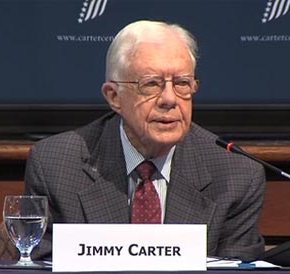By Bob Allen
The abuse of women is “the most pervasive and unaddressed human-rights violation on Earth,” and too often justified in the name of religion, former President Jimmy Carter said at a June 27-29 conference at the Carter Center in Atlanta.
Carter, a lifelong Baptist who famously withdrew from the Southern Baptist Convention over the issue of women’s equality, said the subordination of women is directly contrary to the United Nations’ Universal Declaration of Human Rights “and in my opinion directly contrary to the basic premises of every great religion.”
 “I think it’s good for me to be reminded and for you to be reminded of the incompatibility between religious practices on the one hand as espoused by religious leaders that try to convince their own fellow worshippers that women are inferior in the eyes of God,” Carter told 60 human-rights defenders, religious leaders and scholars representing 15 countries gathered for the conference “Mobilizing Faith for Women: Engaging the Power of Religion and Belief to Advance Human Rights and Dignity.”
“I think it’s good for me to be reminded and for you to be reminded of the incompatibility between religious practices on the one hand as espoused by religious leaders that try to convince their own fellow worshippers that women are inferior in the eyes of God,” Carter told 60 human-rights defenders, religious leaders and scholars representing 15 countries gathered for the conference “Mobilizing Faith for Women: Engaging the Power of Religion and Belief to Advance Human Rights and Dignity.”
“In some cases there are even more gross abuses of religious scripts, religious texts, in the Quran and Bible – the Old Testament and the New Testament, as a matter of fact,” Carter said. “Those singular verses can be extracted and distorted to justify the ascendance or the dominance of men.”
Carter read paragraphs from the Universal Declaration on Human Rights regarding the equal treatment of men and women that every country is sworn to uphold. “They don’t do it, and quite often the excuse for not doing it is because religious leaders say that women are inferior,” he said.
“With many great religions – both Protestant, Catholic, Islamic and others – there is an ordination by men that women are not fit to serve God on an equal basis,” Carter said. “They are precluded from being priests. They are precluded from being pastors. They are precluded from being chaplains, and men are considered to be worthy of holding those positions in the service of God.”
“I happen to be a Christian, and I read the Bible,” Carter said. “I teach the Bible every Sunday in my hometown church,” Maranatha Baptist Church in Plains, Ga.
“In my church we have a man pastor and a woman pastor,” Carter said. “We have six deacons, half of whom are women. My wife is perhaps the most famous Baptist deacon in the world.”
“But in the Southern Baptist Convention, there’s a policy that women cannot be pastors and cannot be deacons and cannot be chaplains,” Carter said. “In some of the Southern Baptist seminaries or universities, it is prohibited for a woman to teach a classroom that has boys as students.”
Carter said the Roman Catholic Church decided in the third or fourth century that women cannot be ordained as priests. “They can be teachers, they can be nurses, but they can’t be priests.”
“This was not the case with the early Christian church,” Carter said. “Paul said that there’s no difference in the eyes of God between a Jew and a Gentile, between a slave and a master or between a man and a woman. And when he wrote to the Romans in Chapter 16 – you can look it up – he points out the heroes of the early Christian church, almost half of whom were women, who are apostles and priests in the early church.”
“But later when men took over, they began to express their opinion, which has now become almost law, that a woman is not equal in the eyes of God,” he said.
Carter said such thinking “leads to much of the abuse of women.” In some countries, he said, women are denied basic human rights because they are regarded inferior to men. Where change is occurring, he said, it is usually reluctantly, “because people who speak out are considered to be traitors of the male-dominating political and economic leaders.”
Conference participants from over 35 faith-based organizations, universities and religious bodies adopted a declaration urgently calling “on all believers to work individually and within their communities to take action toward full equality, justice and human dignity for all.”
The statement noted that throughout history, most religious communities have been led by men.
“Women and girls’ equal participation in religious life, including their engagement with sacred texts, must be understood as crucial,” the statement said, “not only to reclaim the insights of half of our communities, but because we see the unfinished task as deeply harmful.”
The statement concludes that “there is no incompatibility between devotion to religion or belief and the pursuit of universal human rights and dignity.”
“In fact, we believe sacred texts and the living traditions of our faith communities are the richest source of vision for a world in which human rights are fully honored,” participants said. “We resolve to strive together to achieve reciprocity among all people and to honor our moral obligations to each other through mutual respect and concerted action.”
